
by Michelle Xu | Sep 7, 2021 | micro
In the beginning, the women were gooseberries. Plump on the vine, squashed under toe, murderous towards pine. When the rains fell, they became millipedes, scrabbling in pain for warm dirt. When the air dried, they jumped into the pond, careening as frogs, then tadpoles, then eggs. Under the moonlight, they danced as dandelion wisps. It is each speck of them, carried by the northerly wind, that became one of us.

by Kayla Upadhyaya | Sep 2, 2021 | micro
I live in a haunted house. By which I mean I live inside your throat. By which I mean I’ve grown so used to this haunted place that it has become unhaunted. I greet the ghosts. The ghosts are my friends.
You said you wished to press me into your chest, all the way, make an endoparasitoid of me. You said it over tomato sandwiches glopped with mayo and shining with salt.
But I didn’t want to be a caged bird in your center, so I nested in your throat.
When you yell, I feel it here, here, and here.
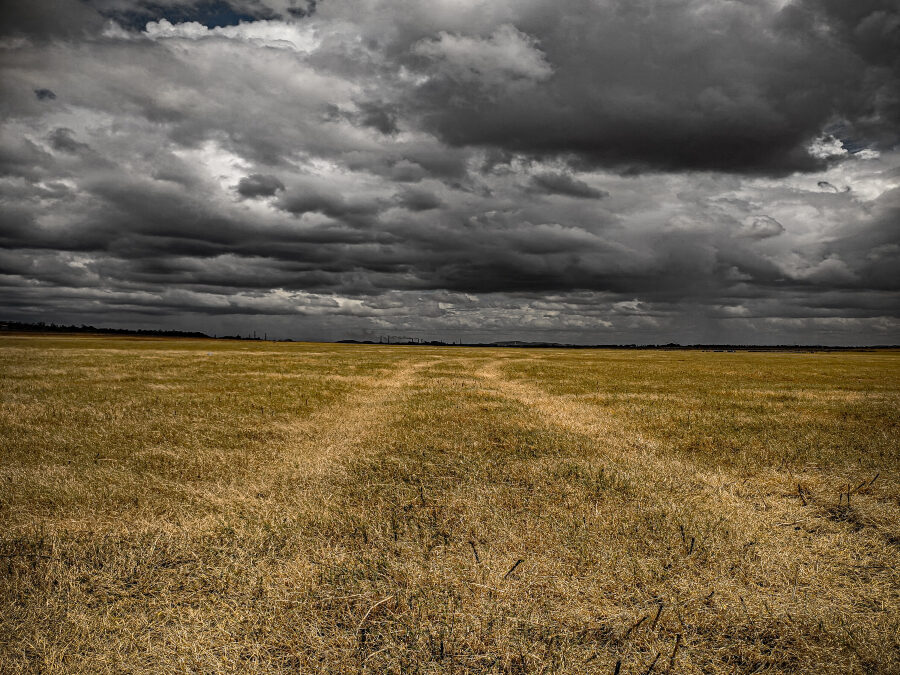
by Maria Picone | Aug 30, 2021 | micro
When she knew she couldn’t keep me, my mother struck a bargain with the ghost men haunting the sky. She fashioned a ship from our placenta—my fuel, her breast milk. The cost of this launch came from her ignorance, her worship of the bone-pale deities that called themselves, stars.
I achieved escape velocity. I saw the ghost men’s bones for what they were: burned-up hulls. I begged to return. They said you orbit the gravitational field of a far greater ideal. God Bless.
But I couldn’t live these dreams. I go on, circling this planet I can never touch.
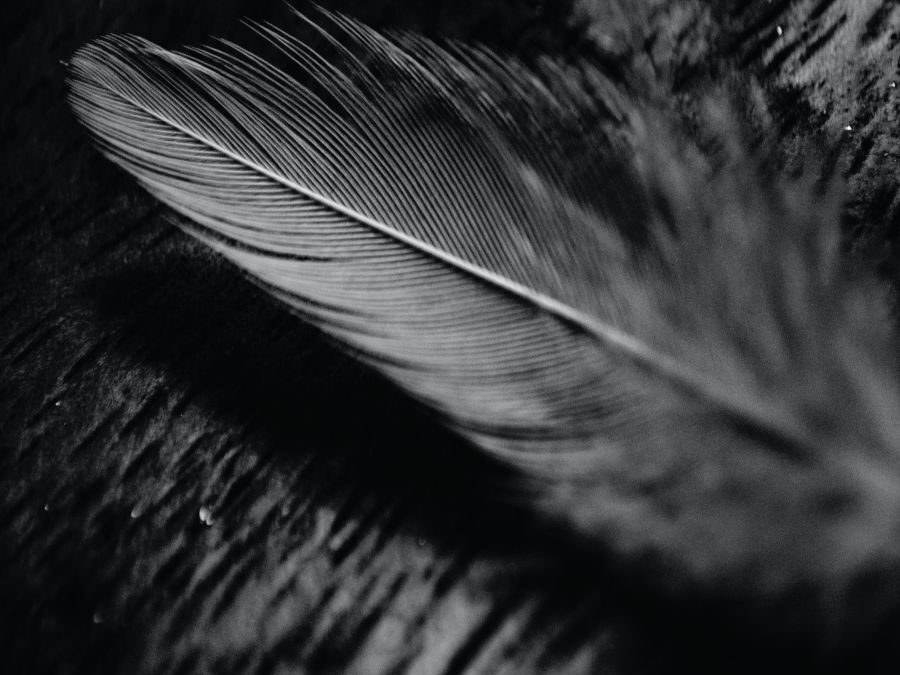
by Caroljean Gavin | Aug 26, 2021 | flash fiction
My five-year-old walks the sidewalks with me into town. There is no other place for him. He holds my finger with one hand. His other hand clutches a headless black bird. He nibbles on it from time to time. I cannot wrench it away from him. It wouldn’t matter. There are always more, dropping from the sky in scores. There is no protecting him. His eyes are wide open, nostrils flared, teeth gnashing and tongue lapping at the wind without boundary.
The grocery doors slide open for us, my son runs through the cool air and straight to the produce. It is hard to stop him. An older woman coughs, coughs, coughs, and even through her coughing she glares at me. The little black birds spin out of her mouth. Keep control of your kid. The bananas are all black, the nectarines have rotted in their bags, the apples bruised beyond recognition. My son grabs a putrid, weeping mango and takes a huge bite. It’s a man staring this time, a stocker, looking over his stack, his eyes tightening over his mask, and behind the mask, little beaks, poking, poking, poking, trying to break through. You’ll have to pay for that. We will. We do. We pay for everything and seven cans of chili and three boxes of snack cakes and almonds and jerky and so many pouches of apple sauce while the birds circle and my son reaches up for the arms of every stranger, reaches up for the wing of every bird. What can I do? We have to eat.
My five-year-old walks through the parking lot with me, towards the school. He holds my finger with one hand. The drop-off line is a crush of cars. The birds are thick. Each car door that opens lets out a clot of them, that ride the air to join the birds hovering over the building or the birds pecking through the grass, waiting. I throw my arms over him. But there is no protecting him. Not once he gets inside. If he does not go inside, they tell me, if he does not see the other children play, he will not learn to play. If he does not go inside, they tell me, if he does not see the other children talk, he will never learn how. I cannot keep him inside, I cannot keep him safe, this is what they tell me. My five-year old son is so hungry for the clamor, he breaks away from me and runs, runs, runs inside chewing on his dead bird in one hand, slurping up his rotten mango from another, and the classrooms are full of the corvids and there is nothing, nothing, nothing I can do.
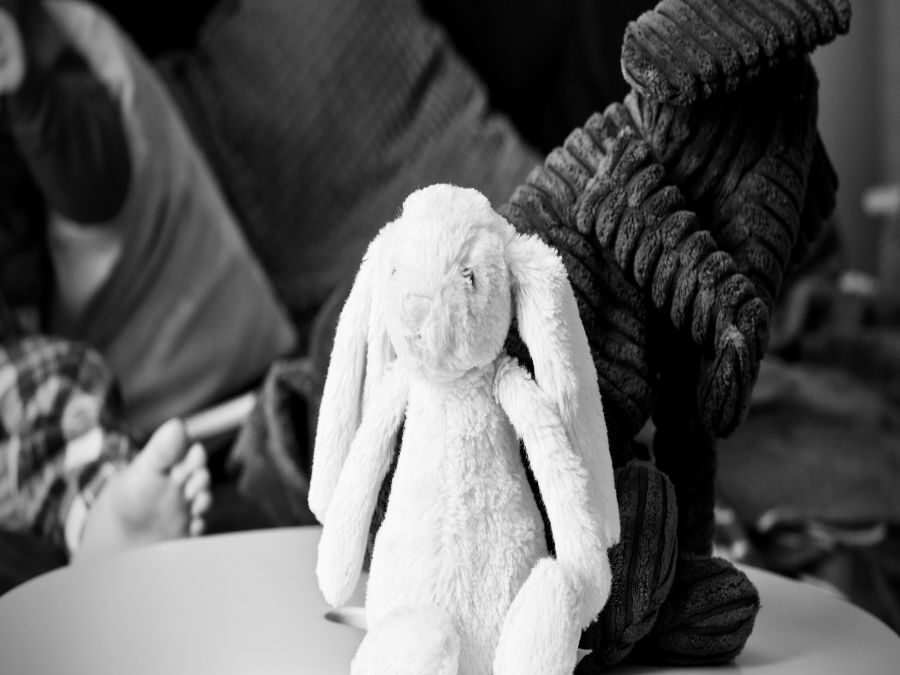
by Kathy Fish | Aug 23, 2021 | flash fiction
1. Tangerines
Rodney and Chelsea have decided this is the day. They are sixteen years old and they are in love. Neither of them has ever done it, though Rodney has come close, with a girl he worked with at Dairy Queen who smelled like French fries and who had perfect, melon-sized breasts. Chelsea’s breasts are more the size of tangerines, but he likes them. He likes that she smells like Fruit Loops and that her front teeth overlap slightly. Her mouth is glossed. He slips his tongue inside.
2. Bear Spirit
“Rodney’s an old man’s name,” Chelsea’s mom says and calls him Rascal instead. It makes Rodney feel like a Labrador.
Chelsea’s mom believes that life is a celebration and that people should live in the Now. Chelsea has an older brother named Royal. Nobody knows where the hell he is. He ran away from the halfway house downtown, the place Chelsea’s mom said was his best chance and hope. He has a behavior disorder which involves beating people up. He doesn’t know his own strength is what Chelsea’s mom says. He has a bear spirit. He is unruinable.
The last guy he beat up now walks with a cane.
3. The Bunnies
Chelsea’s father left when Royal was ten and Chelsea was a newborn. Every Easter, he sends Chelsea a six foot Easter bunny and now she has sixteen huge Easter bunnies and there are no more places to sit in Chelsea’s house. Sometimes people sit on the bunnies’ laps or sometimes they just stand, looking around or sometimes they sit on the floor.
4. A Small Complication
Their first date, Rodney plucked a daffodil from Chelsea’s garden and presented it to her at the door. And Chelsea’s mom gave them Boone’s Farm, mixed with a splash of 7 Up. All three of them got a little drunk, sitting on the porch watching the sun go down and a full moon rise. Chelsea’s mom insisted on driving Rodney home. Before he got out of the car, she pulled his face to hers and kissed him, hard.
5. About Rodney’s Parents…
Rodney doesn’t have any siblings. He feels lucky, given the circumstances. His mother died of cancer when he was five. He remembers standing on tip-toe to reach a cookie off a plate on the counter and her hand slapping it away. He tries to really see that hand, to see something about it that is especially hers, but it always ends up being just a hand.
Rodney’s father is a podiatrist who is working on his overall fitness. Every day at dawn, he walks the perimeter of the cul-de-sac, gripping fifty pound dumbbells in each hand. In warm weather he goes without a shirt, his burgeoning muscles gleaming. He makes three trips around, bobs his chin to Chelsea’s mom who watches from her kitchen window, and lays the dumbbells on the porch in the special box. He consumes nothing but protein: lamb chops, sausages, steaks as thick as two hands clamped together. He will never love another woman, he promises Rodney, who really doesn’t care if he does or not. Rodney only wants his father to be happy, which his father assures him he is.
6. Clinical
Two bunnies sit in opposite corners of Chelsea’s bedroom. One is missing an eye and one’s polka-dotted ear is nearly torn off. Rodney and Chelsea undress in a clinical manner, and fold their clothes, as if they have decided to join the Army together. Rodney has seen parts of Chelsea but never the whole and now he stands before her and reaches out to touch one tangerine breast. Unsure of what to do with her own hands, Chelsea simply places them on Rodney’s shoulders.
She’s afraid to get closer because his thing is standing up. She digs her toes into the pink shag rug and closes her eyes. The breeze through the window is making the shutters flap against the window frame and Rodney’s breath smells like oatmeal and grape jelly.
7. The Now
At this moment Chelsea’s dad is getting fired from his job selling tires in Terre Haute and her mom is hunched over a patient, scraping plaque in an office downtown, thinking of that kiss and Royal’s getting the shit kicked out of him in a bar in Tucson. At this moment, Rodney’s dad’s outside on the curb, sweating, coughing, turning blue, as Rodney kisses Chelsea. Like howling into her mouth.
Originally published in Blip Magazine (now New World Writing)

by Sarah Fawn Montgomery | Aug 19, 2021 | flash fiction
N says we’re looking for that Leo and Kate love that crashes sudden, veins fire and ice, the kind where you go down with the ship.
I tell N that Kate didn’t die, except inside, but N doesn’t mind because she’s lusting after Leo while I’m trying not to stare at Kate’s pale bobbing breasts. I wonder how he can concentrate enough to draw her with a steady hand, to make a solid line. Her skin’s like N’s, translucent moon and swoon.
We lay out in the sun to urn, trying so hard to be golden that even our skin peels away from us. We talk sky (good) and sea (better) and how to breathe in a circle to make the music last.
We’re listening to the Spice Girls say what they really, really want and N shows me how to be two ways at once—breathing in even as you exhale. “The note won’t break,” she says, fingering her imaginary clarinet. “No one knows when you’re struggling for air.”
I can’t keep up. I’m always spurting out staccato, gasping where I begin, choking when I end.
N touches my throat, my stomach. We practice breathing together like the afternoon never ends.
Maybe love is Leo letting go, the way he freezes when the hurt is too good. N swears he’s ro-man-tic, stretching out the middle like her want, gender a pulse in her throat. Her hand grasps mine during sleepover movies when an asteroid heads towards earth or the poltergeist comes through the television.
It feels like everything is always dying—my breath on my tongue, the small fish of N’s foot in my lap when Ben saunters by, the smell of vanilla body spray we waltz through before the school dance where we slam our bodies down and wind them all around.
Ben grabs my waist and later N cries because she has no one to dance with but me.
“Connect the dots,” N says into the mirror while I bring her Dr. Pepper Lip Smackers to my lips like a kiss. “You don’t count.”
With the lights out and the glow-in-the-dark bracelets we wave through the gym, I am a specter, my lonely lit up for the world to see.
In band, N taps my thigh to keep time. I struggle to keep up, the sound my instrument makes a strangle. It’s better not to make noise, I think. Since I’m always behind, it’s better not to breathe at all.
In science I label the parts of a jellyfish—the tentacles, the arms that capture prey and ingest them with poisonous venom, but that also pull desire up into the mouth hidden hungry in the center of the creature. They pulse and billow like ghosts, gorgeous if they want, invisible if they need.
I remind N that the Titanic didn’t sink that deep, instead became a reef. Jellyfish dance through the ballroom, stand on the railing, arms out and flying.
But N isn’t interested in the wreckage, just the wreck. She wants that romance where someone loves you because they leave. Where you know you were special because someone haunts you the rest of your life.
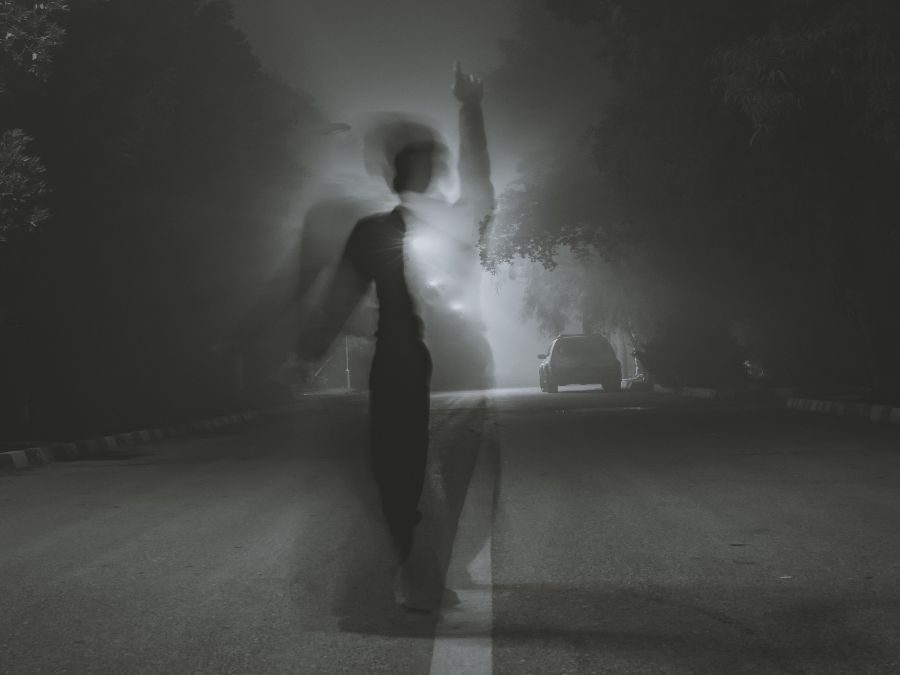
by Regan Puckett | Aug 16, 2021 | contest winner, flash fiction
“A Guide to Small Town Ghosts” is actually four linked micro-stories, each of which devises and fulfills its own narrative shape while overlapping with the others to create a macro-shape. Think of that carnival game that requires you to drop four metal disks so that they fill the area of a circle: that’s the visual analogy that comes to mind. As a formal device, it’s unusually demanding, but the story satisfies the challenge of it with both ease and precision. That in itself is an achievement. Watching the grace with which the narrative makes its shapes brings one kind of energy to the proceedings. I admire it even more, though, for the oddity of its vision and the dynamism with which it pursues it. In less than a thousand words, Regan Puckett creates a world with its own unique system of operations, its own wholly individual idea of what ghosts are and why they’re meaningful, then places the action in conversation with that idea, and finally overturns and reconfigures it. I’m envious. From Judge Kevin Brockmeier.
Finding:
In this town, there are five thousand ghosts, and they all wear your face. For years, you’ve shed them like outgrown sweaters, some frayed, moth-eaten, others that never quite fit. Most ghosts fall away cleanly, fully composed, and roam the town. One lingers in the birthday card aisle of the pharmacy, pilfering through yellow envelopes. Another sits cross-legged in an elevator at the hotel where you used to work, steals plastic shampoo bottles and presses their coldness into its ghostly cheek. One ghost left this town entirely. It sends you postcards from cities you’ve never been to, each signed with your name in faint ink. You’ve never written back.
Other ghosts keep too close. Half-baked phantoms, they linger, tugging at your pockets, stepping on your ankles. They huddle, unsevered and heavy, weighing you down. Used to, you’d shed ghosts at a manageable rate: one every year, two if you were unlucky. Now, they tumble from you daily. Collect like lamps at an antique shop, some cracked, chipped, some that buzz as they illuminate.
You wonder if with every ghost, you’re closer to dying. Your own body feels lighter, capable of fleeing the floorboards, fleeing the town, if you stretch to your toes and try. When the ghosts pull at you, you cement yourself in place. Each day, it’s harder to settle.
Banishing:
After three sleepless weeks, you search Craigslist and find a local medium rated 3.7 stars. One reviewer swears the medium reunited him with his lost wife. Another thinks the medium might’ve been bullshit, but notes that the nighttime noises stopped bothering them. You fill in the online form, divulging as many details as possible. Do the ghosts keep you up at night? Do they weigh you down when they’re near? Do you ever think about dying? You click, click, click, type in your credit card number to pay for a session.
The medium scrutinizes every memento on your walls with a set of shrouded, disapproving eyes. Yes, she says, again and again, tracing her long, rotten eggplant nails along the smooth glass of a penguin snow globe, over the cracked spines of your books.
The ghosts are fallen pieces, she declares, readying to leave. Bits you’ve lost.
Can I get rid of them? You conjure ideas of sage, special candles.
You already have.
As your front door creaks shut, a fresh ghost creeps from your mouth and flutters clumsily to the ceiling, moaning in a ghastly, newborn fashion. You leave a 2-star review and gulp peppermint mouthwash to rid yourself of the taste.
Hiding:
The ghosts don’t bother anyone else. Everyone walks through them, unnoticing of their gathering and taunting, undisturbed by the sounds the ghosts make, like the inhalation of an iron train as it prepares to take its final trip, or the siphoning of terror through the teeth of a whale swallowing its prey. One ghost starts its broken song, and each join until the chorus fills every crevice of the town, inescapable. No one else minds. For a while, you pretend not to mind either. You avoid the glossy glass eyes of the spirits as you walk through the grocery store, or along the sidewalk, but each ghost you pass reaches out. Wraps their shadowy tendrils around your fingers and swings your arm as it joins you.
You decide that if you change, the ghosts can’t recognize you. You shear your dark hair over the bathroom sink, watch the broken waves fill the ceramic bowl, overflow. You paint what’s left on your head white and empty your wardrobe into the biggest trash bags you can find, leave it on the road for someone else to take. When your therapist asks about the drastic changes, you tell her about the ghosts, how they keep you up through the night, so large and heavy you’re pushed off the bed and onto the floor. She tells you everyone’s haunted by something and prescribes anxiety medication.
The ghosts are undeceived by your new look. They swarm you, each sighing the same metal sob as they push you into the house. They wrap your body in your old clothes until your limbs are paralyzed by layers of cotton and flannel. Strand by strand, the ghosts reattach your severed hair onto your scalp, sealing it into place with a phantom kiss.
Becoming:
You call an exorcist, but he’s overbooked for the holidays. You call your mother, but she dismisses you with a thin sigh and change of subject. Desperate, you call an exterminator.
I’m not in the business of ridding ghosts, he says, voice static through the phone line. But I’ve dealt with my own before.
How? You ask. A ghost traces circles along your spine.
Trapped ‘em in a jar like fireflies and waited for the little lights to fizzle.
So, you set the traps, perching wide-mouthed jars around each room. By night, the ghosts have squeezed themselves inside, too curious for their own good.
Now, you sit atop your quilted bed, sealed jars scattered before you. Your ghosts pound against the glass, wailing. You think you can understand their cries now, the metallic cacophony that tumbles between your ears and rattles your synapses, gripping every memory it can. Your father’s funeral, two weeks after his birthday, the one you never sent a card for. The sharp scent of your old boss’s cologne as he invited you into an empty hotel room, his hand warm against your cheek, lust you mistook for love. The postcards from your sister, the one who got away from this town and didn’t take you with her. You feel each death anew.
The ghosts quiet. Their lights dampen like blown-out bulbs. You fill your throat with the words you’ve never known how to say, and they all spill out at once, a silver shriek that echoes on. And as you wail, your body grows lighter, freer. Floating upwards, you escape.
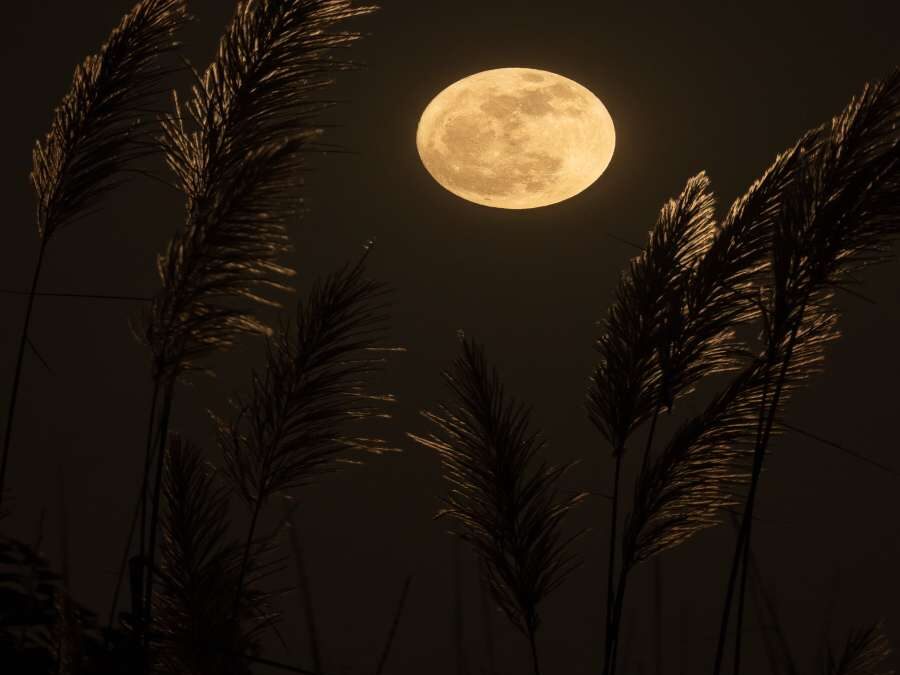
by Sarah Boudreau | Aug 12, 2021 | flash fiction
Some works of fantasy make you feel that they are not ornamenting reality so much as unearthing one of its most elemental components. Such is the case with “The Changeling.” It was at the story’s halfway point, with the appearance of the thread-people, that I found myself thinking, however implausibly, “Oh! This story is actually telling the truth.” Its emotional timbre is gently achieved, as a result of which I never resisted it, and whether or not it sought to move me, it did. I was impressed by how complete a narrative of the changeling’s life Sarah Boudreau manages to create and how saturated the story’s pages are in the way that life feels to him, expressing the sadness of a boy who begins his journey through the world by failing to belong to it and ages into a man who never does. From judge Kevin Brockmeier.
The little boy takes apart radios, old cameras, lawnmowers—whatever he can find that his parents won’t immediately miss—and he does so with the precision and ferocity of a crow picking at carrion. By the time he puts his puzzles back together again, hours have whisked past him. He won’t remember that his parents or his sisters have checked on him, opening the door to his bedroom to see him sitting hunched, tiny shoulder blades knitting together as he works.
Often, the metal stings his hands, irritating them pink before layers of skin turn hard and dry, then fall off. The doctor says he is allergic to iron alloys. In fact, he is allergic to many things, and he is resistant to many more. He rarely eats what his mother makes him, and his frequent headaches make him throw up what little nutrition he retains. Sometimes, he sits with his parents as they watch television in the evenings, and that is his way of telling them he loves them. The boy is not charismatic in the way that sick children are sometimes charismatic—he is a scurrying creature whose eyes will not meet yours.
His mother tries to be concerned, but, as she says, he is such a difficult child. His illnesses make him miss school so often that his teachers are unhappy, and they blame her. She is tired of him, but she will only admit this to her husband late at night when she is sure the boy is fast asleep.
The boy, however, rarely sleeps well. Some nights, it feels like his bedroom walls are humming around him and a current flows through his bones until they ache. His body moves without asking his mind first: he drags his blanket and pillow out of the house, and he makes a nest in his backyard, at the edge of the woods. Some nights, he makes it back inside before anyone notices. Some nights, his parents find the boy curled in the dewy grass. He tells them it’s quieter out there.
Once, when he is nine, he drops his blanket and pillow at the treeline, and his body walks him into the woods. A bloated moon lights a deer path, and he steps over fallen boughs and crisp leaves until he sees a small clearing. Here, a dozen figures sit around a ten-foot-tall pile of gold thread. It is stiff metal, thin and glinting in the moonlight, snarled into a heap. The people sort through it with long, elegant fingers, slowly untangling it and winding it around a giant wooden spool.
One of the thread-people smiles at him and beckons him to help. The boy joins their circle and they sit, working wordlessly, until morning. Unlike the metal of the machines, the thread does not hurt his hands. The untangling weighs down the parts of his brain that always feel like they are floating out of his grasp. When the sky begins to brighten, he walks back to his house, stiff from sitting for so long, but smiling.
He discovers that the thread-people work only by the full moon, and he keeps a calendar so he knows when to visit them. They make progress on the knotted mess, winding it several times around the spool, and though they rarely speak, the boy knows that the other thread-people enjoy their task as much as he does. Some of them he sees every month: the antlered man, the woman who can only whisper, the tattooed child, the man with birds in his hair.
One night, when he is eleven, he sees a boy who could be his mirror, but taller, with the hollows of his cheeks filled in. He doesn’t dare look at him for long, busies himself with the wire in his hands. He hears the whisper-woman hiss at the other boy, calling him rude for trying to meet his eye. His double never returns to the clearing to fumble his way through loops of gleaming wire, and the boy forgets about him.
The boy grows up. His mother hopes he will learn to converse with people, to look them in the eye, to smile warmly, but he never does. When he is a teenager, his classmates ask him if he is going to shoot up the school. When he is an adult, he becomes a mechanic and wears thick gloves to keep the steel from burning his hands. Here, he tends to machines in solitude and waits until he can join the good, quiet people in the moon-soaked clearing.
Every full moon, he slides out of bed. He opens the door left scorched from the time he drank too much and tried to burn down his house with himself inside. Everything is so loud, he had said to the whiskey. My brain is so loud I can feel it.
He makes his way through the trees behind his own house—though he is miles from the deer path, he knows he will reach the clearing if he walks long enough. He helps spool the ever-tangled thread, as he has always done. The other thread-people look at him sadly now, at his fast-greying hair and his tense, arthritic gait, as their bodies do not decay in this place. They welcome him back with pity and guilt.
In the morning, because it is all he knows, he will put down the gold thread and walk back to the loud, iron-studded world not made for him.
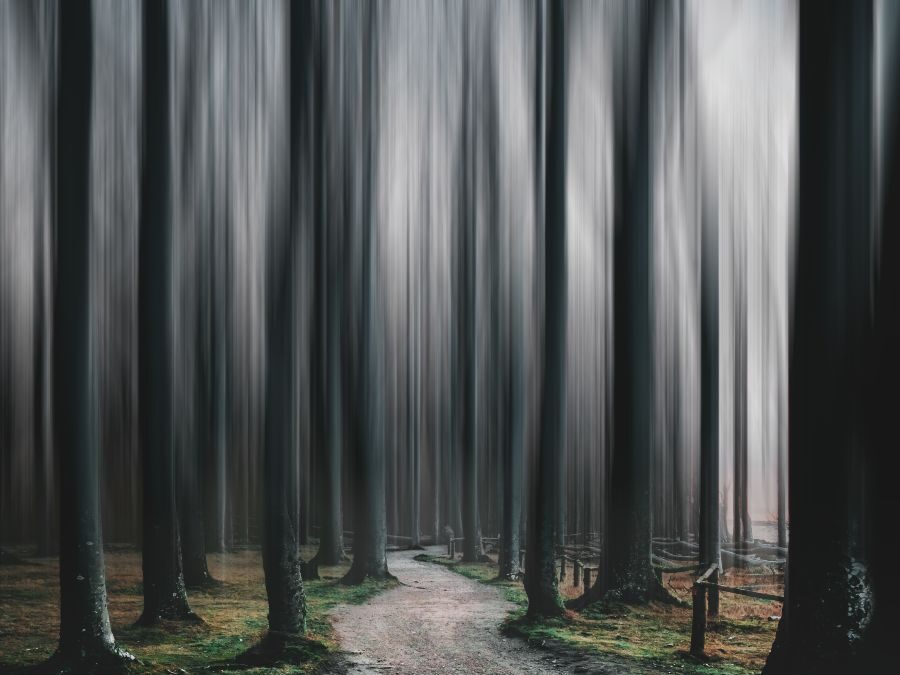
by Yume Kitasei | Aug 9, 2021 | contest winner, flash fiction
Like a Grimms’ fairy tale transported to Japan, “A Too Small Room” proceeds through a world whose houses, forests, and marketplaces are elementary, even quintessential, but make up only half its substance, since the space in which it exists is built every bit as much from story as from landscape. I was delighted by how far it ventured from its initial mood of pained constraint, showing us two women whose lives at first seem “no bigger than a sigh” before they stretch and grow and “curve ahead like a bend in a road.” Though the tone Yume Kitasei strikes is classical, she does the daring work of trading her narrative between two unique points of view—something that’s not easy to achieve gracefully, never mind in a story of so few pages. The balance keeps shifting between Mei’s perspective and Akari’s, so elegantly that you’re hardly aware it’s happening, and the setting expands just as elegantly from a pocket of dirt in the ground to the vastness of the universe. From Judge Kevin Brockmeier.
Akari was born in a room no bigger than a sigh. There was no door. As she grew, the room grew too – but only so much, and then she was forced to stop growing. She had to sit with her legs folded up beneath her chin, her long hair down around her ankles. She didn’t wonder if there was more to the world than the room, she only knew the world wasn’t big enough for her.
She stretched, shimmied, scratched at the walls, and cried out with a voice she didn’t know she had.
Mei, the woodcutter’s daughter, walked through the forest. She was looking for wood to cut for the house she would build for herself.
The axe on her shoulder was rusted and heavy, stolen from her brother. In her backpack was a knife, a raggedy blanket, needle and thread. Also, a sack of rice, saved grain by stray grain for five years, without anyone in her family noticing.
Mei spotted bamboo, straight and tall enough for her to cut, if she wanted to prove to herself that she could do a thing she had always been told she couldn’t.
Akari, in the too small space, thought she heard a voice that wasn’t hers. She pressed her ear against the wall. The wall was singing. Or not the wall. How?
Her world began to shake. She nearly lost her head as the axe blade bit through the top of her room.
The bamboo fell, and the woodcutter’s daughter stumbled back in shock. A girl no bigger than her arm crawled out of the chamber of the bamboo.
Mei and Akari regarded each other in the soft green light that filtered down through the forest.
Then Akari looked around and began to weep. The world was much bigger than she had thought. She might have crawled back into the bamboo, but Mei reached out and picked her up like a doll.
“What were you doing in there?” Mei asked as if either of them had ever chosen to be born.
Mei laid out the old blanket and set Akari down on it. She went about cutting more wood.
By evening, she’d accomplished little. Mortified, she lay down next to Akari and listened to the crickets and the shush-shush of the leaves. Perhaps she ought to go home. It was too hard. Most likely, she would fail.
But next morning, Mei woke feeling stronger. In the other girl’s eyes, she felt the tendon and sinew in her arms grow taut. She cut trees, made a clearing, built a house. The wood she chose was wrong: the frame splintered, and it fell down. But her second one stood straight, and the roof kept out the rain.
Meanwhile, Akari grew taller and learned to speak. She named herself. She never came inside even in the snow, so Mei built a porch under the roof, and Akari slept there with her toes delightfully cold and sticking over the edge.
This is how the Governor’s son saw her when he came riding through the woods. He was startled by the crude hut, and this strange girl beneath a patched quilt. He stopped and woke her. She was only as tall as a child. Her fingers were delicate, her body slender and twisted.
She answered him in a reedy voice. “Go with you? Where?”
Mei came out of the house and glared at this man.
“I didn’t know there is more beyond the forest,” Akari said.
“Don’t go,” said Mei.
But for Akari, the forest was still a too small room.
The Governor’s son lived in a busy town. He gave her a fine room, but Akari preferred the night sky. She missed Mei. Everyone in town stared at her. But Akari continued to grow.
In the forest, Mei’s rice dwindled, then was gone. She had thought when the time came, she and Akari would journey to town together, but now Mei was alone. At last, she could no longer put off what was necessary, so she built a sled, piled it with wood, and pulled it all the way to town. When she got there, she could barely move. Her whole body ached.
She set up in the marketplace next to the other wood sellers and watched as they sold their wood one by one. All she got were funny looks. Darkness fell, and her stomach growled loudly. She trembled with exhaustion. In the dusk no one could tell she was an eccentric woman in men’s clothing.
A man hurried up. “Thank goodness you’re still here. My master will take all of it.” He gave her a heavy purse, and she followed the man to a large house: the Governor’s!
The man was surprised to discover his woodcutter was a woman, but now that it was at the house, wood was wood.
Akari was sitting on the porch. She had cut her hair short to save time combing it, and her fingers were black from ink: she was learning to read and write.
The two women embraced.
“Tell me,” Akari said when they were comfortable. “How big is the world?” She heard of strange places in books and wanted to know if they were real.
Mei stretched her tired limbs. Her life curved ahead like a bend in a road. “It’s as big as you can imagine.”
The next night, Akari took a horse and rode towards the moon. It was big and orange and couldn’t be far. She left the horse and climbed a mountain.
At the top, she reached out with both hands and stood on her tiptoes. She reached out and caught the wind. Away and up she went, all the way to the moon.
When the Governor’s son returned to the hut, he found Mei singing and sweeping the floor. “Why are you so happy?” he asked. He had looked everywhere for Akari.
“You’ll never find her,” said Mei. “She is out there looking for the walls of the universe.”

by A. Poythress | Aug 6, 2021 | flash fiction
“god at the side of the road” has the quality of folklore from centuries ago and worlds away that’s somehow been transplanted to contemporary middle America, a place that’s too new and too hopeful to understand the forces it’s confronting. It’s the narrative voice, though, in an unusually intimate second-person key, that gives the story much of its potency. From Judge Kevin Brockmeier
They say a god lives down by the side of the road.
They say it’s the god of roadkill and dead things and there’s no harm in letting it haunt the streets, but you know that ain’t right.
You’ve actually seen it.
If you take a right at the fork at the bottom of the hill, you’ll find it. It wears the hides of all those animals that get flattened by cars speeding by, all those opossums and coons and deer. It uses their broken bones and splattered organs to keep itself alive and moving and you can always tell it’s coming by its stink.
But you know it doesn’t limit itself to those crushed critters, not if it can help it.
It’s slow, that’s why it takes from those things that are already dead. All those broken parts don’t let it move as fast as it wants.
Maybe, back when the thing had first been born, or made, or however the hell it came into existence, maybe it was quicker back then. Back when it had its own limbs and skin and things. Maybe it was sleek and quick and took what it wanted. Back when people spent more time walking about, before cars were ever even thought of. Back when it had more access to its favorite prey.
See, thing is, animal scraps are just what it uses now, outta necessity.
You know what it actually likes, because you saw it take Billy from down the road, back when you were both still stupid and young. You’d warned him that he was too drunk, that he oughta let you drive instead, but he’d sworn up and down that he was fine, laughed that you were just being a worrywart.
Well, he was just as drunk as you’d claimed he was, and the roads were slick from a shower neither of you had known about. He took that right-hand turn going nearly 90 miles an hour. It was almost inevitable that the truck flipped the way it did.
All you can remember is the lights flashing off the asphalt, off the leaves of the trees lining that old country road. Then there was pain and you must’ve been knocked out for a little while after that, because when you came to, you were hanging from your seatbelt upside down.
Everything hurt, your head from the dashboard and your chest from the seatbelt still keeping you suspended. But it was what’d kept you alive.
When you looked left, you saw Billy with his head hanging half his neck, blood splashed all over the broken glass of the windshield. He hadn’t been wearing his seatbelt and you could see his arm twisted the wrong way, a bone in his thigh sticking out from the skin.
And then, while you were shouting Billy’s name, begging him to be okay, some foul odor started filling up the truck. You thought maybe it was a cut gas line, but you knew the smell of gasoline, and this wasn’t it. This smelled like rotted things, fetid things, things left out under the sun so long that the only creatures that could possibly stand the smell were buzzards and maggots.
You gagged, bile rising strong up your throat, but you covered your mouth with both hands when you saw something reaching in past Billy’s window. It had long fingers tipped with black claws that gripped at Billy’s twisted arm and yanked his body right out the truck.
The sound of cracking and something wet filled the truck then, and you battled with your seatbelt until it let you loose. It hurt to land on the windshield, but you knew if you didn’t get out, whatever it was that got Billy’d come for you next. You kicked out the window and crawled from the truck, ignoring the broken glass cutting into you. Better to bleed than die.
When you got out and finally got a look in front of the truck, you saw…that thing, face buried in Billy’s chest as it tore into him. It looked up, back at you, and you could see a grey-blue loop of intestine hanging out of its mouth. Sharp white teeth, eyes different colors and shapes, hair that looked more like mangy fur hanging down its back. It crouched on two legs and had two arms, but you couldn’t tell what sort of animal those came from. It was all covered in rank pelts and the slime of decay.
You’d heard of the god of roadkill, everyone in town had been told the stories, but you’d never realized that you counted as roadkill, too. Meat smeared across the asphalt was still meat, after all.
It started to rise onto its back legs and you took off, no matter how much every step hurt. You ran and ran, not stopping until you came to the first farmhouse down the road.
The sheriff never found Billy’s body—just a smear of blood leading from the wreck into the woods. No one believed what you said you’d seen that night.
They say a god lives down by the side of the road, but you know better. It ain’t no god.
It’s something else altogether.











Recent Comments